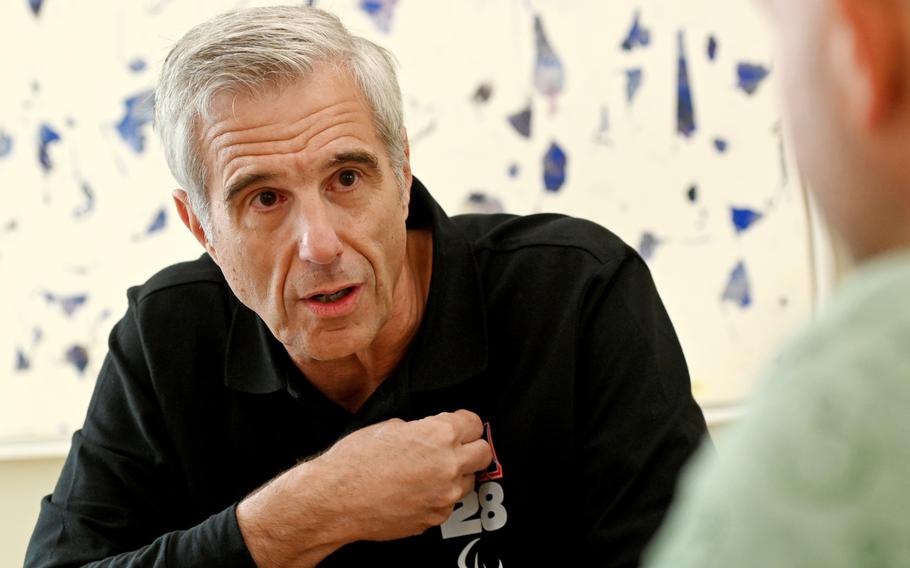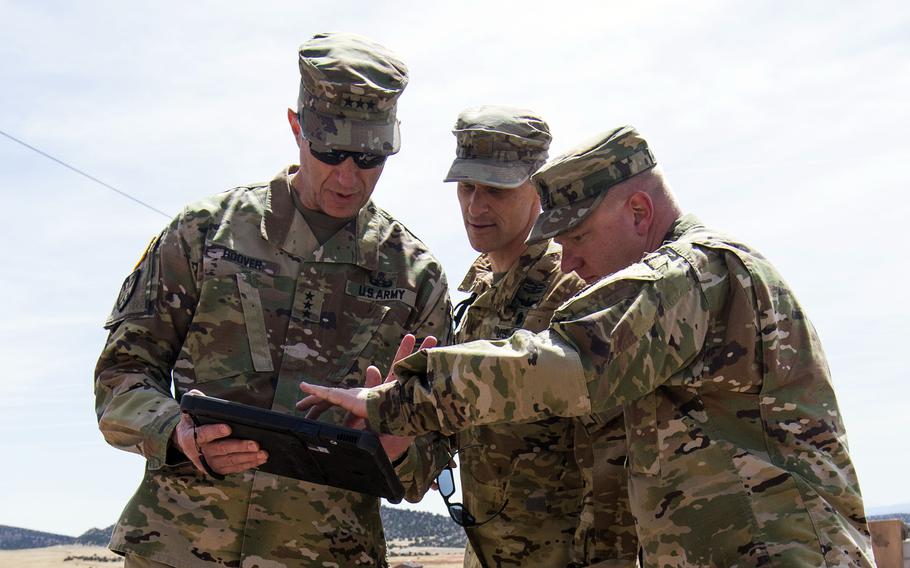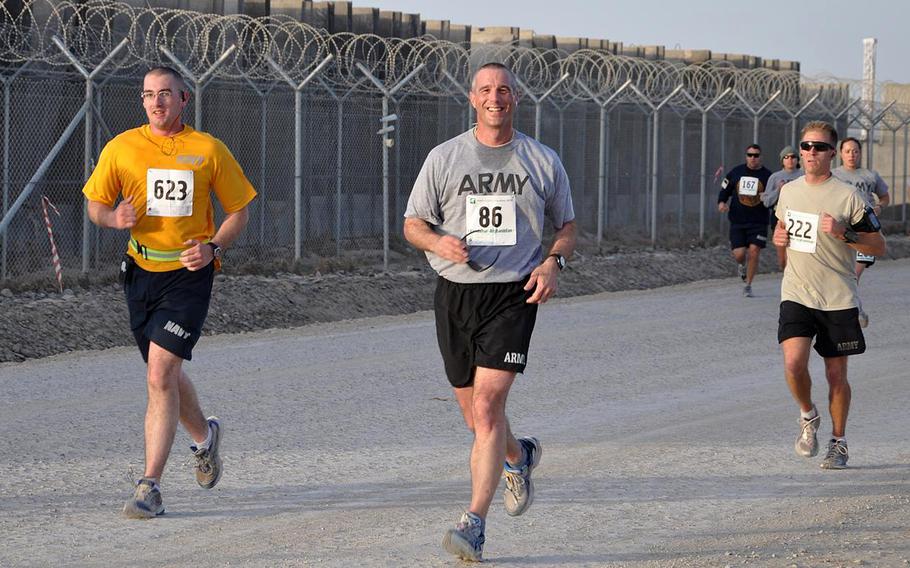
Reynold Hoover, the CEO of the 2028 Los Angeles Olympic and Paralympic Games. A retired U.S. Army lieutenant general, Hoover said of Paralympics athletes, "I do cheer a little louder for the veterans on the field of play out of respect for what they did for all of us.” (Michael Abrams/Stars and Stripes)
Reynold Hoover sees plenty of parallels between putting on the Olympics and running an Army command.
This is the first time the retired lieutenant general has taken responsibility for any sporting event, let alone one the size of the Summer Olympics and Paralympics in Los Angeles in 2028.
But when LA28’s new CEO looks through the lens of his nearly 40 years in uniform, it all comes down to four things: planning, operations, logistics and security. He’s done that many times, with one significant difference.
“I’ve told the staff, though, ‘Look, we’re not being shot at, we’re not at war and nobody’s dying,’” Hoover said during an interview last week at LA28’s Paris offices during the Paralympic Games. “When we put it in perspective, it’s just a really big military operation. We get the right people in the right places and we’re off to the races.”

Then-Lt. Gen. Reynold Hoover, U.S. Northern Command deputy commander, Maj. Justin Douglas and Sgt. Maj. Brad Anderson, from left, review a digital X-ray of a simulated suspicious device from a scenario at an explosive ordnance disposal competition in 2018 at Fort Carson, Colo. Hoover is now the CEO for the 2028 Los Angeles Olympic and Paralympic Games. (Lance Pounds/U.S. Army)
Taking his oath at the U.S. Military Academy on July 2, 1979, Hoover described himself as a “back-of-the-class cadet.” He left West Point as a military policeman before shifting to explosive ordnance disposal in the Army and National Guard. He worked in that role during Operation Desert Storm in Iraq.
He later deployed as commander of the Joint Sustainment Command in Kandahar, Afghanistan, from 2009 to 2010. His last assignment was as the deputy commander of the U.S. Northern Command at Peterson Air Force Base, Colo., which is now a Space Force installation.
On the civilian side, Hoover served in various roles at the Federal Emergency Management Agency and the Homeland Security Department during the George W. Bush administration.
Happily retired, Hoover settled into mentoring at the Army War College. But when he got a call “out of the blue” about the LA28 job, he hopped on the opportunity.
“What better way to come back and capstone nearly 40 years in uniform than do this?” said Hoover, who began the job June 10. “To unite the world, unite the nation, unite L.A. through sport and do it at a time when I think the nation and the world and L.A. and all of us could use some uniting.”
Hoover has had brushes with the Olympics for decades.
The 63-year-old fondly recalled watching 1980’s Miracle on Ice as a plebe at West Point. The hockey semifinal in which the Americans upset the heavily favored Soviet Union squad at Lake Placid, N.Y., was the first time he and his fellow freshmen were allowed in the dayroom with TV privileges.
He then worked in EOD support for the 2002 Winter Games in Salt Lake City.
He likened the difference between his time at the Winter Games and taking over as CEO of the Summer Games as the change between serving as a captain in Desert Storm in 1990-91 and deploying as a brigadier general during the surge in Afghanistan 18 years later.
“As I think back on Salt Lake City, I was that captain at a very tactical level, and now I’m at the very senior, strategic, operational level of planning and thinking and delivering what’ll be the best Games ever,” Hoover said.
A soccer player in his youth who got into rugby later in life, Hoover and the rest of the LA28 organization spent much of the Summer Games in Paris as part of an International Olympic Committee observation program for future Games hosts.
Meanwhile, Hoover followed active-duty soldiers and veterans who competed in Paris closely. He got emotional when discussing the performances of Paralympians Army Sgt. 1st Class Elizabeth Marks, Marine veterans Dennis Connors and Jorge Salazar, and Army veterans Bobby Body and Jason Tabansky, among others.

Then-Brig. Gen. Reynold Hoover, head of Joint Sustainment Command in Afghanistan, passes the 9-mile marker during a half-marathon at Kandahar Airfield on March 7, 2010. Hoover is now the CEO for the 2028 Los Angeles Olympic and Paralympic Games. (Joe Cashion/U.S. Army)
Hoover said he carries the names of the five soldiers under his command in Afghanistan who were killed. He also recalled the shooting at the Texas base now called Fort Cavazos in 2009 that left 13 dead. He was stationed there at the time.
“I carry all that with me, probably a little PTSD, and I do cheer a little louder for the veterans on the field of play out of respect for what they did for all of us,” Hoover said.
With the Paris Paralympic Games ending last weekend, the Olympics community turns its attention first to Milano Cortina, Italy, for the 2026 Winter Games and then to Los Angeles.
Hoover said Los Angeles has a tough act to follow with Paris. He acknowledged Southern California can’t re-create the iconic venues that the City of Light could, with beach volleyball competition in front of the Eiffel Tower.
Yet the U.S. group has plans to make sure the Games not only equal the majesty of Paris but surpass it in a Hollywood sort of way.
“We intend to raise the bar again so that when Brisbane ’32 looks back and people are going to say what they were saying to us,” Hoover said. “’LA28 has raised the bar. What are you guys going to do?’”